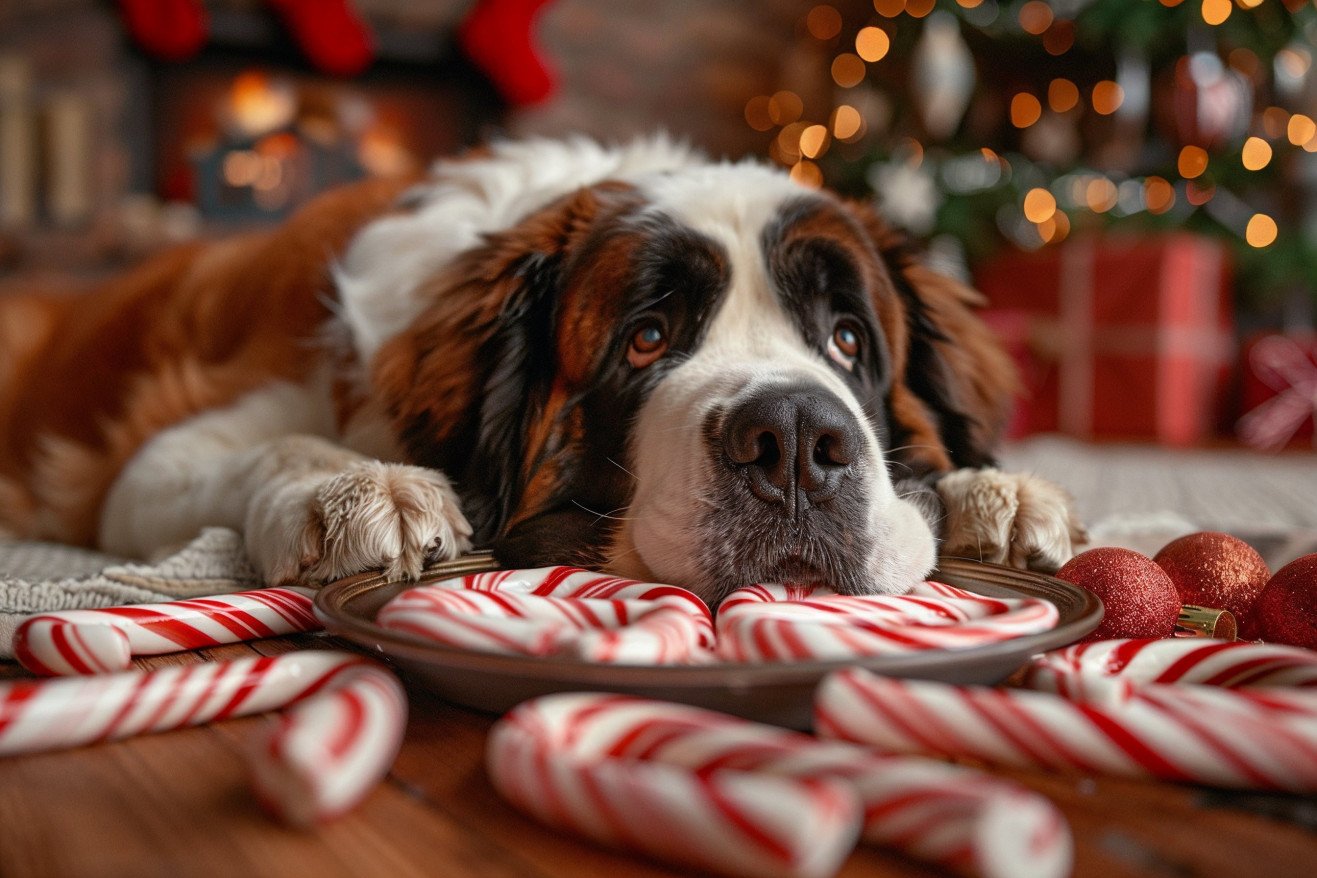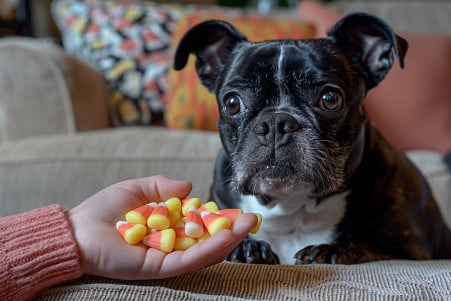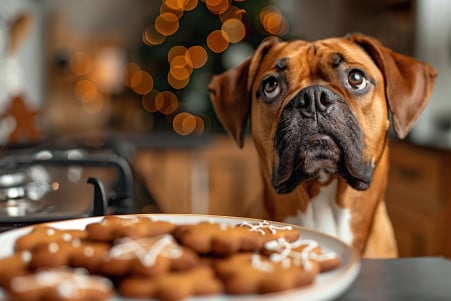Can Dogs Have Candy Canes? Other Holiday Dangers for Dogs
2 April 2024 • Updated 2 April 2024

As much as dogs may want to enjoy the sweet scent and flavor of candy canes, the popular holiday treats can be dangerous for our four-legged friends. Candy canes are high in sugar, which can be hard for dogs to digest and lead to issues like obesity, diabetes, and dental problems. They also often contain xylitol, an artificial sweetener that is highly toxic to dogs and can result in liver failure, seizures, and death in extreme cases. To be safe, it's best to avoid giving candy canes to your dog and opt for treats that are safe for dogs instead.
While the smells and tastes of the holiday season are hard for dogs to resist, sharing the treats we love with them, like candy canes, can have negative effects. To learn more about the dangers and find out what you can give your dog instead, let's take a closer look at information from veterinarians, pet nutritionists, and well-known pet care organizations. Through their studies and reports, we'll learn how to make sure our furry family members stay healthy and happy during the most wonderful time of the year.
Can dogs eat candy canes?
Toxic Ingredients in Candy Canes: In-Depth
While candy canes may seem like a fun and festive holiday treat, they contain several ingredients that are extremely toxic to dogs. One of the most dangerous is xylitol, a sugar substitute that is commonly used in many candy cane brands. According to the American Kennel Club, even small amounts of xylitol can cause liver failure, seizures, and hypoglycemia in dogs.
Peppermint oil, which is used to flavor candy canes, is another ingredient that poses a danger to dogs. The Pet Poison Helpline states that peppermint can cause gastrointestinal upset, vomiting, and even central nervous system depression in dogs. In addition, artificial dyes like Red 40, which is often used to create the red stripes on candy canes, may cause problems. According to Wild Earth, this petroleum-based dye has been linked to cancer in animal studies.
Other ingredients, including copper chlorophyllin (which is used to create green coloring) and citrus oils (which are used in fruit-flavored candy canes), can also be dangerous to dogs. Since even a small amount of these ingredients can be harmful, it’s important to keep candy canes away from dogs. This way, pet owners can avoid the potential dangers of these holiday treats and ensure that their dogs stay healthy and happy throughout the holiday season.
Other Holiday Hazards: How to Keep Your Dog Safe
In addition to candy canes, there are many other holiday foods and treats that can be dangerous for dogs. For example, the Poway Vet points out that cooked poultry bones can splinter and cause a dog to suffer from internal injuries, and the high fat content in turkey skin and gravy can lead to painful pancreatitis.
The Purina and Family Veterinary Clinic also note that onions, garlic, chocolate, raisins, and certain nuts can be toxic to dogs, leading to issues ranging from gastrointestinal upset to organ damage. Even items that contain caffeine, like coffee and tea, can be harmful.
To make sure your dog stays safe this holiday season, it's important to keep all potentially dangerous foods and substances out of your dog's reach. With a little bit of awareness and planning, you can make sure your dog has a safe and happy holiday.
Safe and Healthy Holiday Dog Treats
Although many holiday human foods are off-limits to dogs, there are some safe and healthy options that can be given to dogs in moderation. The ASPCA Pet Health Insurance lists safe human foods for pets as sweet potatoes, pumpkin, squash, potatoes, rice, green beans, pears, apples, blueberries, turkey meat, and roast beef. The Sky Canyon Animal Hospital adds baked sweet potatoes, raw apple or applesauce, low-salt green beans, lean white meat, canned pumpkin, and a bite of cranberry sauce to the list of safe holiday treats for dogs.
For a quick and festive option, iHeartDogs.com suggests pre-packaged treats such as Zuke's Mini Naturals Holiday Trees, DreamBone Holiday Variety, and Whimzees dental chews. These treats are made with natural, high-quality ingredients and formulated to be delicious and nutritious for dogs. That said, the SplootVets note that treats should not exceed 10% of a dog's daily caloric intake to avoid potential gastrointestinal upset and weight gain.
By including these safe and healthy options, dog owners can treat their furry friends to a holiday snack while ensuring their well-being throughout the holiday season. That said, it's still important to be mindful and prevent dogs from accidentally eating any toxic human foods.
Emergency Response: What to Do If a Dog Eats Candy Canes
If your dog eats a candy cane or other potentially dangerous holiday treat, it's important to act fast and get medical help. Even small amounts of xylitol, which is often used to sweeten candy canes, can lead to liver failure, seizures, and hypoglycemia in dogs, according to the American Kennel Club. Meanwhile, the Pet Poison Helpline notes that symptoms such as vomiting, weakness, ataxia, and seizures can be signs of xylitol poisoning or other problems.
Call your vet or the Pet Poison Helpline at (855) 764-7661 immediately to find out how to proceed. Depending on your dog's situation, you may need to induce vomiting or take your pet to the emergency vet to ensure they don't experience any long-term health issues. Don't delay getting help from a professional if your dog eats a candy cane or another dangerous holiday treat.
Pet-Proof Your Home for the Holidays
In order to avoid accidental poisoning or exposure to other dangers, it's important to pet-proof your home for the holidays. This means, as the Paramount Pet Health blog explains, making sure all decorations, plants, and holiday foods are safely stored and out of your pet's reach. It also means securing Christmas trees and making sure electrical cords and other wires are out of the way and can't be chewed on.
The ASPCA and Humane Society also suggest creating a safe, quiet space for your pet to escape to when they need a break from the holiday chaos. You may also want to use pet gates or crates to block off certain areas of your home and make sure your pet has proper identification in case they get out.
By following these tips for pet-proofing your home, you can make sure your dogs stay safe and healthy during the holiday season. With a little extra attention and effort, you can make sure your pets are able to enjoy the season with you.
Conclusion: How to Keep Your Dog Safe and Healthy
The holiday season is a time for celebration, but it's also a time to be aware of the potential dangers and risks that can impact our furry family members. By avoiding giving dogs candy canes and other toxic foods, pet-proofing our homes, and keeping an eye out for potential dangers, we can help ensure that our dogs have a safe and happy holiday.
If an emergency does occur, it's important to act quickly and seek professional medical help to avoid serious health issues. The American Veterinary Medical Association notes that it's important to know how to get in touch with your local 24/7 emergency veterinary clinic before an emergency happens.
With a little extra effort and attention to detail, we can enjoy the holidays while keeping our dogs safe and healthy. As the American Kennel Club points out, taking steps like securing the Christmas tree, keeping an eye on electrical cords, and preventing access to poisonous plants can help ensure that our dogs have a happy and healthy holiday season.


